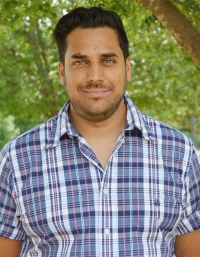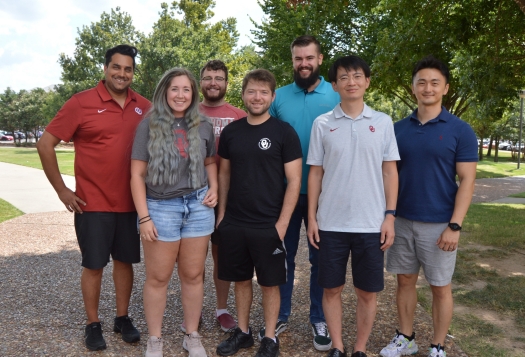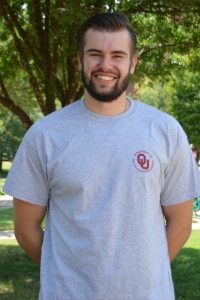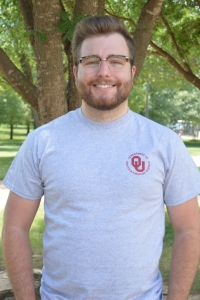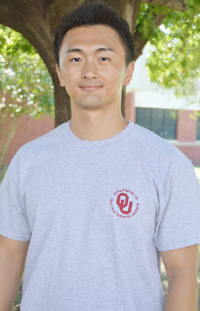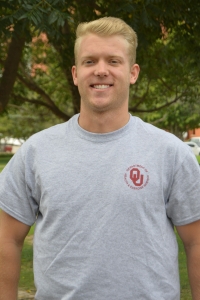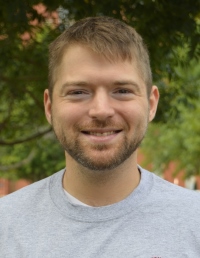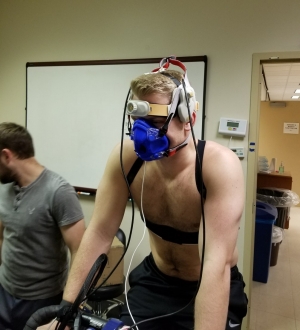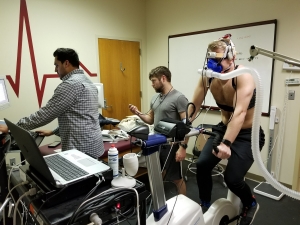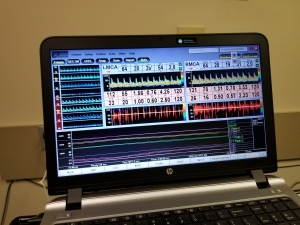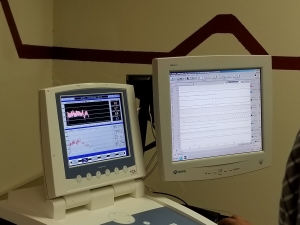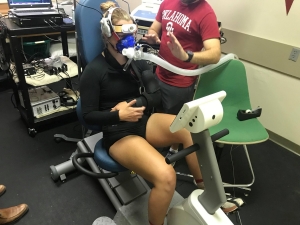Dr. J. Mikhail Kellawan received his BSc (Honors) from the University of Guelph (Guelph, Ontario, Canada) and his MSc from the University of Victoria (Victoria, British Columbia, Canada). He completed his doctoral work at Queen’s University (Kingston, Ontario, Canada) before completing a Postdoctoral Fellowship at the University of Wisconsin-Madison. Dr. Kellawan has exhibited excellent scholarly potential during his graduate and post-doctoral work which includes research awards from the American Heart Association, and several from the American Physiological Society. Currently, Dr. Kellawan is an Assistant Professor and the Director of the Human Circulation Research Laboratory (HCRL) in the HES department. His work largely focused on mechanisms that control blood flow in skeletal muscle and cerebral circulations during exercise and environmental stress in humans. His work is designed to understand the physiological mechanisms that limit cardiovascular support of the brain and skeletal muscle with the aim of developing treatments and strategies to improve human health and performance.
Dr. Kellawan is also a member of the Cellular & Behavioral Neurobiology Graduate Program (http://www.ou.edu/cbn/)
EDUCATION
B.Sc., Honors, Human Kinetics, University of Guelph
M.Sc., Kinesiology, University of Victoria
Ph.D., Kinesiology and Health Studies, Queen’s University
RESEARCH INTERESTS
Peripheral vascular control
Hypertension
Insulin resistance
Human performance
Physiological overlap between cardiovascular and cognitive-degenerative diseases
Medical Imaging
Cardiovascular Pharmacology
Peripheral Artery Disease
Diabetes
COURSES TAUGHT
HES 3853 Exercise Testing and Prescription
HES 4953 Senior Capstone
HES 6823 Cardiorespiratory Exercise Physiology
HES 5863 Physiology of Aging
PUBLICATIONS
Ashley, J.D., Shelley, J.H., Sun, J., Song, J., Trent, J.A., Larson, D., Larson, R., Yabluchanskiy, A., Kellawan, J.M. (2020). Cerebrovascular Responses to Graded Exercise in Young Healthy Males and Females. Physiological Reports, 8, e14622, https://doi.org/10.14814/phy2.14622
Stone, B.L., Beneda-Bender, M., McCollum, D.L., Sun, J., Shelley, J.H., Ashley, J.D., Fuenzalida, E., Kellawan, J.M. (2020). Understanding Cognitive Performance During Exercise in Reserved Officers’ Training Corps: Establishing the Executive Function-Exercise Intensity Relationship. Journal of Applied Physiology 129, 846-854, https://doi.org/10.1152/japplphysiol.00483.2020
Gonzales, J.U., Fischer, S.M., Maharaj, A., Vellers, H., Anderson T, Karnjanapiboonwong A, Subbiah S, Kellawan, J.M., Figueroa, A. (2020). Response of exercise‐onset vasodilator kinetics to L‐citrulline supplementation during different phases of the menstrual cycle. Physiological Reports 8, e14536, doi: 10.14814/phy2.14536.
Kellawan, J.M., Peltonen, G.L., Harrell, J.W., Roldan-Azate, A., Wieben, O., Schrage, W.G. (2020) Differential contribution of cyclooxygenase to basal cerebral blood flow and hypoxic cerebral vasodilation. American Journal of Physiology: Regulatory, Integrative and Comparative Physiology, 318, R468-R479
Sun, J., Ashley, J., Kellawan, J.M., (2019) Can Acupuncture Treatment of Hypertension Improve Brain Health? A Mini Review Frontiers in Aging Neuroscience 11(240), 1-8
Rosenberry, R., Tucker, W.J., Haykowsky, M.J., Trojacek, D., Chamseddine, H.H., Arena-Marshall, C.A., Zhu, Y., Wang, J., Kellawan, J.M., Tian, F., Nelson, M.D., (2019) Determinants of skeletal muscle oxygen consumption assessed by near-infrared diffuse correlation spectroscopy during incremental handgrip exercise Journal of Applied Physiology 127, 698-706
Tucker, W.J., Rosenberry, R., Trojacek, D., Chamseddine, H.H., Arena-Marshall, C.A., Zhu, Y., Wang, J., Kellawan, J.M., Haykowsky, M., Tian, F., Nelson, M.D. (2019) Studies into the determinants of skeletal muscle oxygen consumption: Novel insight from Near-infrared diffuse correlation spectroscopy Journal of Physiology 597 (11), 2887-2901
Kellawan, J.M., Limberg, J.K., Scruggs Z.M., Nicholson, W.T., Schrage, W.G., Joyner, M.J., Curry, T.B. (2018) Phosphodiesterase-5 inhibition preserves exercise onset vasodilator kinetics when NOS activity is reduced Journal of Applied Physiology 124(2), 276-282
Limberg, J.K., Malterer, K.R., Kellawan, J.M., Schrage, W.G., Wilkins, B.W., Nicholson, W.T., Eisenach, J.H., Joyner, M.J., Curry, T.B. (2017) Potentiation of the NO-cGMP pathway and blood flow responses during dynamic exercise in healthy humans European Journal of Applied Physiology 117(2), 237-246
Hoscheidt, S.M*., Kellawan, J.M*., Rivera, L., Berman, S., Turski, P., Carlsson, C.M., Asthana, S., Johnson, S.C., Rowley, H., Wieben, O., Schrage, W.G., Bendlin, B.B. (2017) Insulin resistance is associated with lower cerebral blood flow and hypoperfusion in cognitively healthy middle-aged adults. Journal of Cerebral Blood Flow and Metabolism 37(6), 2249-2261 (*co-first author)
Kellawan, J.M., Harrell, J.W., Roldan-Azate, A., Wieben, O., Schrage, W.G. (2017) Regional hypoxic cerebral vasodilation facilitated by diameter changes primarily in anterior versus posterior circulation. Journal of Cerebral Blood Flow and Metabolism 37(6), 2025-2034
Kellawan, J.M., Peltonen, G.L., Schrage, W.G. (2016) To measure diameter or not: experimental design is key: Comments on Crosstalk 30: The middle cerebral artery diameter does/does not change during alterations in arterial blood gases and blood pressure. Journal of Physiology 000.0, 1-8
Limberg, J.K., Peltonen, G.L., Johansson, R.E., Harrell, J.W., Kellawan, J.M., Eldridge, M.W., Sebranek, J.J., Walker, B.J., Schrage, W.G. (2016) Greater beta-adrenergic receptor mediated vasodilation in women using oral contraceptives. Frontiers in Physiology 7(215), 1-8
Limberg, J.K., Johansson, R.E., Peltonen, G.L., Harrell, J.W., Kellawan, J.M., Eldridge, M.W., Sebranek, J.J., Schrage, W.G. (2016) β-adrenergic mediated vasodilation in young men and women: Cyclooxygenase restrains nitric oxide synthase. American Journal of Physiology: Heart and Circulatory Physiology 310(6), H756-H764
Kellawan, J.M., Harrell, J.W., Schrauben, E.M., Hoffman, C.A., Roldan-Alzate, A., Schrage, W.G., Wieben., O. (2016) Quantitative cerebrovascular 4D flow MRI at rest and during hypercapnia challenge. Magnetic Resonance Imaging 34, 422-428
Walsh, J.J., Scribbans T., Bentley, R.F., Kellawan, J.M., Gurd, B.J., Tschakovsky, M.E. (2016) Neurotrophic growth factor responses to lower body resistance training in older adults. Applied Physiology, Nutrition, and Metabolism 41(3), 315-323
Owen A.L., Kellawan, J.M. (2015) Upstream Stiffness, downstream problems: not all arteries are equal. Journal of Physiology 593(20) 4517-4518
Kellawan, J.M., Johansson, R.E., Harrell, J.W., Sebranek, J.J., Walker, B.J., Eldridge, M.W., Schrage,W.G. (2015) Greater exercise vasodilation in women: role of nitric oxide synthase and cyclooxygenase European Journal of Applied Physiology 115(8), 1735-1746
Kellawan, J.M, Bentley, R.F., Bravo, M.F., Moynes, J.S., Tschakovsky, M.E. (2014) Does oxygen delivery explain inter-individual variation in forearm critical impulse? Physiological Reports 2(11), e12203
Limberg, J.K., Kellawan, J.M., Harrell, J.W., Johansson R.E., Eldridge, M.W., Proctor, L.T., Sebranek, J.J., Schrage, W.G. (2014) Exercise-mediated vasodilation in human obesity and metabolic syndrome: Effect of acute ascorbic acid infusion. American Journal of Physiology: Heart and Circulatory Physiology 307(6), H840-H847
Bentley, R. F., Kellawan, J. M., Moynes, J. S., Poitras, V. J., Walsh, J. J., Tschakovsky, M. E. (2014) Individual susceptibility to hypoperfusion and reductions in exercise performance when perfusion pressure is reduced: evidence for vasodilator phenotypes. Journal of Applied Physiology 117(4), 392- 405
Kellawan, J. M., Tschakovsky, M. E. (2014) The Single-Bout Forearm Critical Force Test: A New Method to Establish Forearm Aerobic Metabolic Exercise Intensity and Capacity. PLoS ONE, 9(4)
Moynes, J., Bentley, R.F., Bravo, M., Kellawan, J.M., Tschakovsky, M.E. (2013). Persistence of functional sympatholysis post-exercise in human skeletal muscle. Frontiers in Exercise Physiology, 4(131), 1–15
Kellawan, J.M., Stuart-Hill, L.A., Petersen, S.R. (2009) The Effects of Caffeine During Exercise in Fire Protective Ensemble. Ergonomics 52(11), 1445-1454

